|
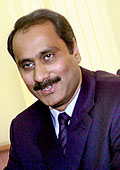 Union
health minister Anbumani Ramadoss is angry, but not at
AIIMS director P. Venugopal (he's already removed the noted heart
surgeon as head of the hospital's Cardio Thoracic Surgery Department).
This time around, his ire is aimed at Swiss drug giant Novartis,
which has challenged India's patent laws that do not recognise
incremental improvements in existing drugs, a tactic also derisively
known as 'evergreening'. "I have asked Novartis to desist
from such action. India has not used compulsory licensing so far,
but in case of such moves we might as well consider that,"
he told reporters recently. What the minister and other advocates
of cheap generics fear is that a successful challenge of the anti-evergreening
laws could affect generic copies of other life-saving drugs such
as anti-retroviral drugs that fight aids. But with billions of
dollars at stake, drug makers such as Novartis are unlikely to
give up the fight so easily.
Union
health minister Anbumani Ramadoss is angry, but not at
AIIMS director P. Venugopal (he's already removed the noted heart
surgeon as head of the hospital's Cardio Thoracic Surgery Department).
This time around, his ire is aimed at Swiss drug giant Novartis,
which has challenged India's patent laws that do not recognise
incremental improvements in existing drugs, a tactic also derisively
known as 'evergreening'. "I have asked Novartis to desist
from such action. India has not used compulsory licensing so far,
but in case of such moves we might as well consider that,"
he told reporters recently. What the minister and other advocates
of cheap generics fear is that a successful challenge of the anti-evergreening
laws could affect generic copies of other life-saving drugs such
as anti-retroviral drugs that fight aids. But with billions of
dollars at stake, drug makers such as Novartis are unlikely to
give up the fight so easily.
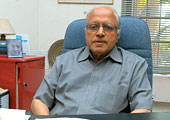 Farmer's
Best Friend Farmer's
Best Friend
At
83, Prof. M.S. Swaminathan is tireless. When BT contacted
him soon after his nomination to the Rajya Sabha, the father of
India's Green Revolution was on a train to Koraput in Orissa,
where his foundation is setting up a centre to research on traditional
plant medicines used by tribals. "We have been working with these
tribals for the last 10 years, trying to provide a sustainable
livelihood for them with their traditional bio-diversity," says
the Chennai-based Swaminathan. The research centre ultimately
hopes to put on mass cultivation plants that would interest the
pharmaceutical industry. But agriculture, understandably, remains
his first love. "I would like to give agriculture its next big
push through SAZs (Special Agriculture Zones)," he says. He's
got the right ideas, and now a more powerful platform, too.
Like Uncle, Like Nephew
 His
uncle fought wars with giant business rivals and didn't just survive
but flourished, and now the nephew will take on well-entrenched
competitors and try to win. We are talking of 32-year-old Anirudh
Bhuwalka, who isn't just the CEO of Asia MotorWorks (AMW),
but also a nephew of Essar Group Chairman Shashi Ruia. "He has
been everything to me apart from just a mentor," says the Boston
University alumnus, whose company recently launched a 49-tonne
truck in Mumbai that will compete with trucks from Volvo, among
others. "Whatever I am today, it's due to my uncle, mentor and
guide Shashi Ruia," he told reporters at the launch. Bhuwalka
is no business greenhorn, though. His Kolkata-based family has
interests in tea gardens and financial services. But what may
have added to the young man's awe of his uncle is Vodafone's recent
purchase of Hutch-Essar, which values the Ruias holding in the
company at a whopping $5.7 billion (Rs 24,510 crore). His
uncle fought wars with giant business rivals and didn't just survive
but flourished, and now the nephew will take on well-entrenched
competitors and try to win. We are talking of 32-year-old Anirudh
Bhuwalka, who isn't just the CEO of Asia MotorWorks (AMW),
but also a nephew of Essar Group Chairman Shashi Ruia. "He has
been everything to me apart from just a mentor," says the Boston
University alumnus, whose company recently launched a 49-tonne
truck in Mumbai that will compete with trucks from Volvo, among
others. "Whatever I am today, it's due to my uncle, mentor and
guide Shashi Ruia," he told reporters at the launch. Bhuwalka
is no business greenhorn, though. His Kolkata-based family has
interests in tea gardens and financial services. But what may
have added to the young man's awe of his uncle is Vodafone's recent
purchase of Hutch-Essar, which values the Ruias holding in the
company at a whopping $5.7 billion (Rs 24,510 crore).
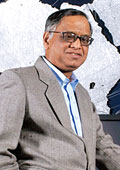 NRN
for President? NRN
for President?
With
president A.P.J. Abdul Kalam's term running out in three months,
and with him having expressed no interest in a second term, the
buzz around N.R. Narayana Murthy's much-speculated nomination
for the apex office has grown louder. Although no political party
has yet come out openly in support of the Infosys Chief Mentor,
a section of intelligentsia and bloggers is rooting for him. Murthy,
61, himself, in the past, has ruled out running for the post,
though he had expressed interest in becoming India's ambassador
to the US. But whatever his chances may have been, they've possibly
become slimmer thanks to a recent controversy over his alleged
disrespect to the national anthem. Handling Indian politics isn't
as straightforward as writing software codes.
Citi's 'Star' Banker
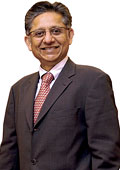 If
you read any of the Asian editions of international business magazines,
then you must already recognise the photo below. After all, Deepak
Sharma is Citi's private banking face in Asia and the Middle
East quite literally-he appears in the bank's ads. Now, he will
probably go on to more editions, given that Citi has enlarged
his role and made him head of global wealth management for all
markets, except the US. In his new role as Chief Executive Officer
of Citi Global Wealth Management International, the Singapore-based
Sharma will now oversee five continents and 2,500 executives,
serving about 400,000 high net worth individuals. "I am very
excited about the opportunity to grow this business at a time
when there is tremendous optimism about the wealth management
industry in many of these emerging economies," Sharma said
in a release. The emerging HNIS in India and China will surely
be on Sharma's radar. If
you read any of the Asian editions of international business magazines,
then you must already recognise the photo below. After all, Deepak
Sharma is Citi's private banking face in Asia and the Middle
East quite literally-he appears in the bank's ads. Now, he will
probably go on to more editions, given that Citi has enlarged
his role and made him head of global wealth management for all
markets, except the US. In his new role as Chief Executive Officer
of Citi Global Wealth Management International, the Singapore-based
Sharma will now oversee five continents and 2,500 executives,
serving about 400,000 high net worth individuals. "I am very
excited about the opportunity to grow this business at a time
when there is tremendous optimism about the wealth management
industry in many of these emerging economies," Sharma said
in a release. The emerging HNIS in India and China will surely
be on Sharma's radar.
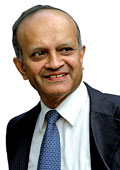 Second
Time Unlucky Second
Time Unlucky
Two
years ago, when UTI bank's parent, the mutual fund giant UTI,
decided to split the chairman and Managing Director title, incumbent
P.J. Nayak threatened to quit. The Finance Ministry in
Delhi stepped in to let Nayak keep his combo title and the job.
But he seems to have run out of well- wishers at North Block.
This time around when the Reserve Bank of India has ordered a
similar split, Nayak has had no choice but to quit rather than
settle for just half the title. So, come July 31, Nayak, 59, will
bid goodbye to a bank where he has spent seven years. The Cambridge
University alumnus' career at UTI Bank has been eventful also
for the controversies he has been able to generate. His initial
days at the bank came under RBI's scanner after the abortive merger
with Global Trust Bank led to charges of insider trading. But
the big question is, who will step into Nayak's shoes, as he has
not groomed anybody within the private sector bank.
-Contributed by Anand Adhikari,
Venkatesha Babu, Krishna Gopalan, Amit Mukherjee and Nitya Varadarajan
|






 Farmer's
Best Friend
Farmer's
Best Friend H
H NRN
for President?
NRN
for President?
 Second
Time Unlucky
Second
Time Unlucky